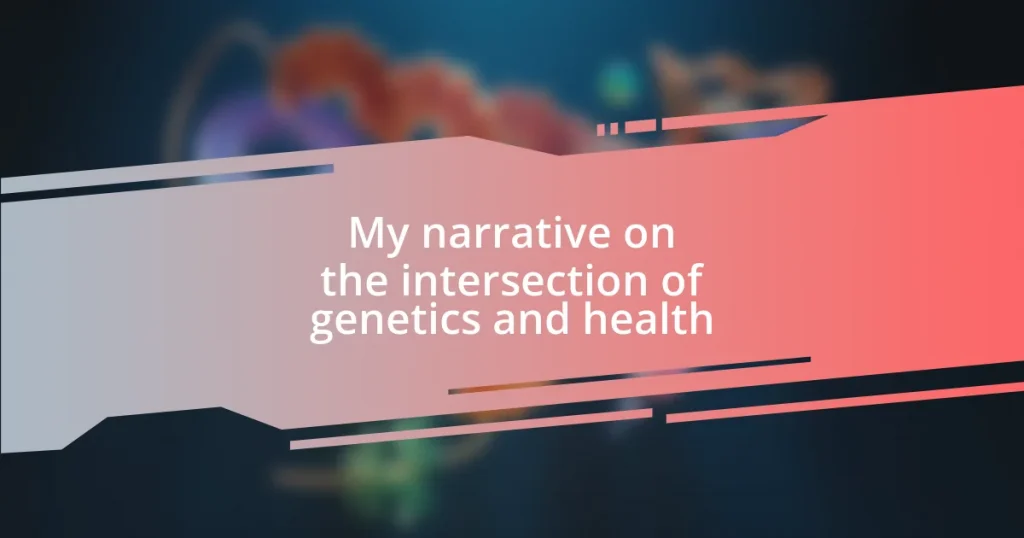Key takeaways:
- Genetic testing empowers individuals by revealing predispositions to diseases and informing personalized health choices.
- Interpreting genetic test results helps connect genetic information to family history and guides preventive healthcare decisions.
- Integrating genetics into healthcare promotes personalized treatment plans, enhancing the efficacy of therapies and proactive health management.
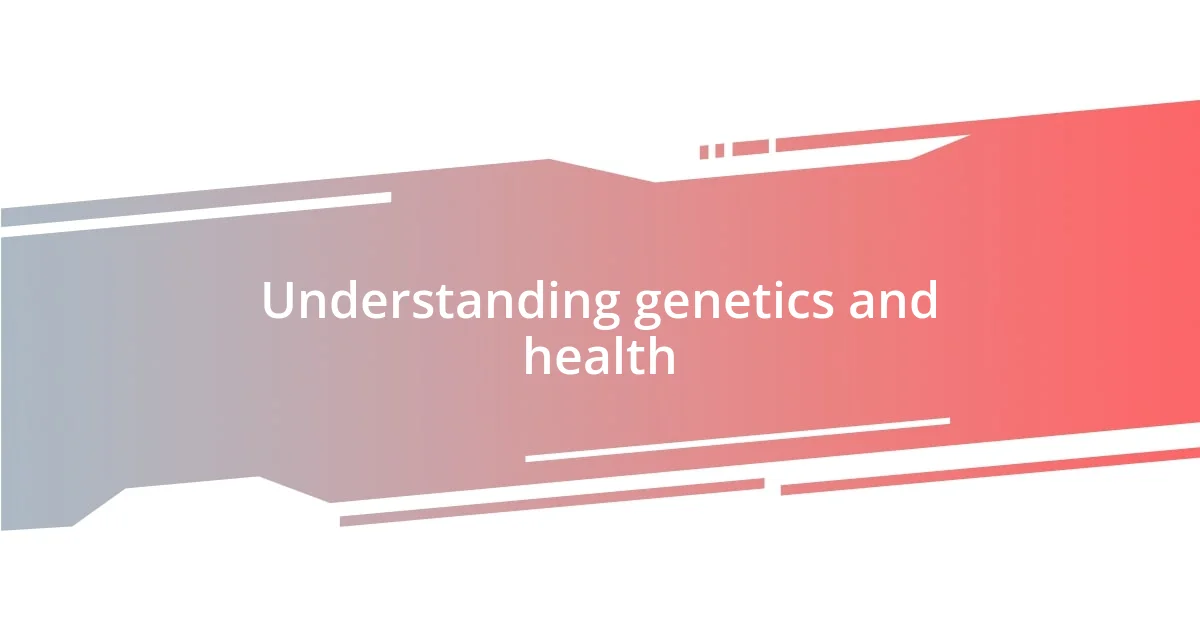
Understanding genetics and health
Genetics plays a critical role in determining our health, shaping everything from our susceptibility to diseases to how we respond to medications. I remember when a close friend shared her genetic testing results with me, revealing a higher risk for certain conditions. It struck me how empowering—and yet daunting—knowledge about our genetic predispositions can be.
Have you ever wondered how something as small as a single gene can influence your health? For instance, I’ve learned that variations in genes can determine how well we metabolize certain nutrients. This realization makes me think about how personalized nutrition—grounded in genetic insights—might be the future of healthcare, guiding us to make choices that truly support our unique biology.
Understanding genetics also invites us to reflect on our family history and its impact on our health. When I look back at generations of my family, I can see patterns of health issues that seem to run in the family. This connection deepens my appreciation for how intertwined our genetic makeup and health are, urging me to take proactive steps toward my wellness based on those insights.
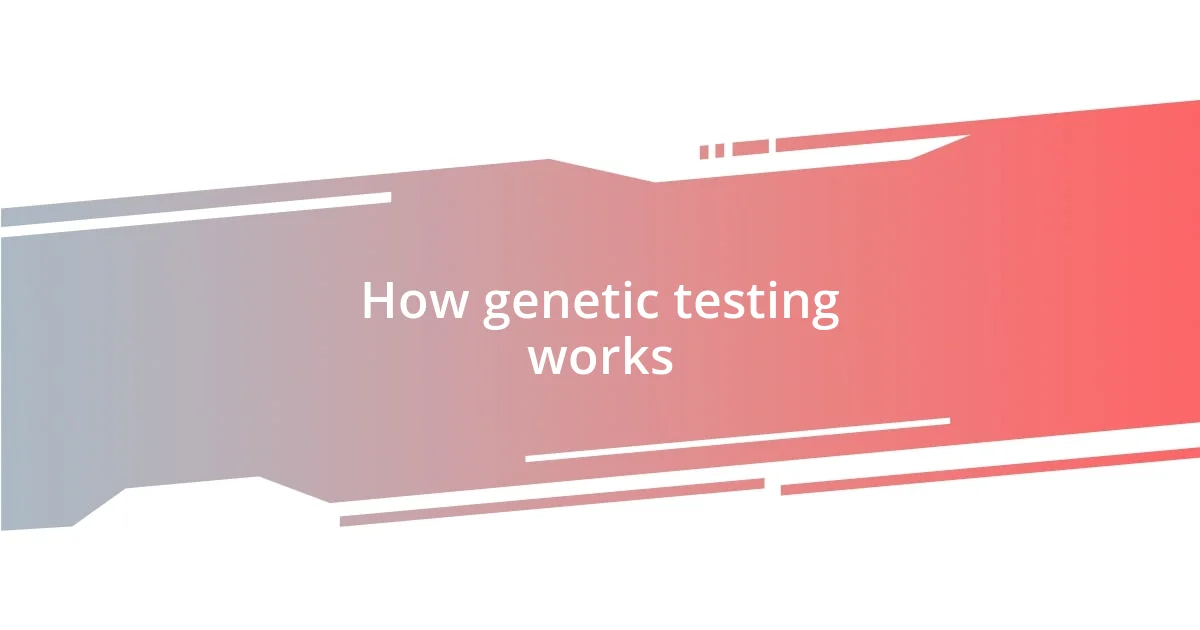
How genetic testing works
When it comes to understanding how genetic testing works, the process typically starts with a sample collection. This can be done through a simple cheek swab, blood test, or saliva sample. I still remember my own experience taking that cheek swab; it felt a bit surreal, knowing that this tiny sample could unlock so much about my genetic makeup. Once collected, the sample is sent to a laboratory where technicians analyze the DNA using advanced technologies like sequencing and genotyping.
Here’s a brief breakdown of the genetic testing process:
- Sample Collection: Providing a sample, usually saliva or blood.
- DNA Extraction: Isolating the DNA from the collected sample.
- Analysis: Using techniques like sequencing to examine the DNA for specific variations.
- Interpretation: Geneticists assess the results to identify potential health risks or traits.
- Reporting: Delivering the findings to the individual, often with guidance on how to understand them.
Each step was filled with anticipation for me, eagerly wondering what insights might be revealed about my health. I remember feeling a mix of excitement and nervousness waiting for those results, knowing they would shed light on both my genetic strengths and vulnerabilities. That anticipation ties directly to the emotional journey that many of us experience throughout genetic testing. It’s fascinating how these moments not only inform us but also prompt us to think about how our genetic inheritance ties into our overall health story.
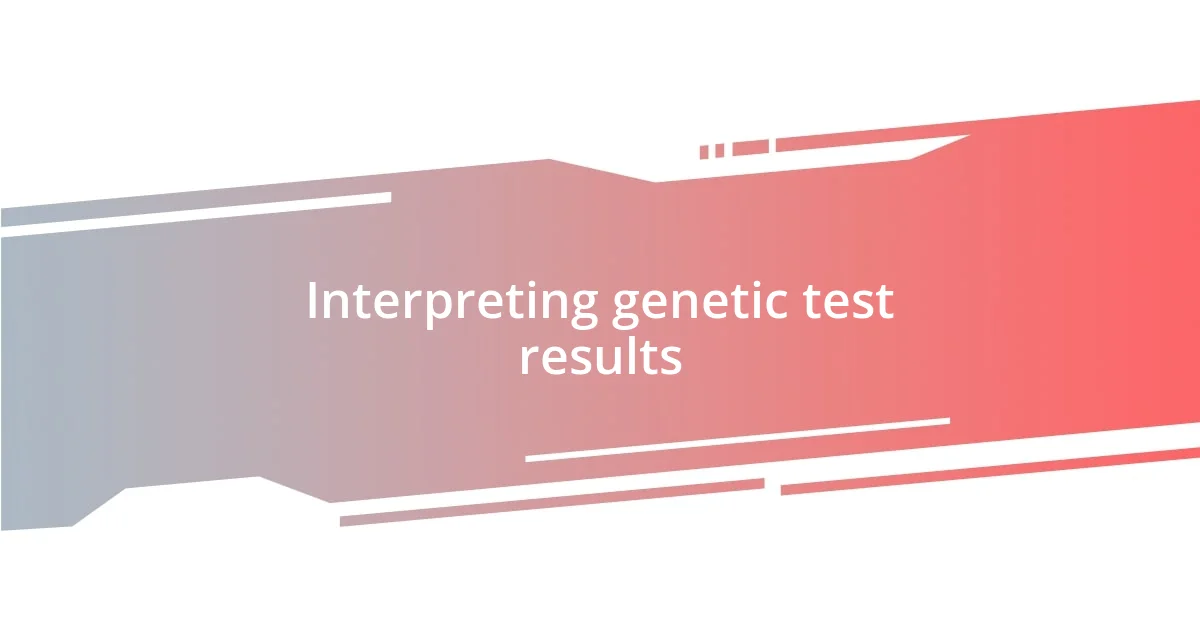
Interpreting genetic test results
Interpreting genetic test results can feel like reading a complex map of one’s own biological landscape. When I first reviewed the report from my own genetic test, I sat down with a cup of tea, imagining I was about to unlock secrets about my health. The various categories—risk levels for diseases, carrier statuses, and traits—felt a bit overwhelming at first. It took me a couple of reads to grasp not just what the numbers meant, but how they related to my life and health decisions.
The results are often classified into three categories: pathogenic variants, likely pathogenic variants, and benign variants. Each category tells a different story about how one’s genetic makeup can influence health. I recall the moment I found out I was a carrier for a certain inherited condition; it filled me with a mix of concern and renewed motivation to maintain a healthy lifestyle. Understanding these classifications is crucial because they can guide important decisions about preventive care and screening.
It’s also essential to process these results in the context of family history and lifestyle. My brother’s experience with a genetic condition highlighted for me how these results often connect back to inherited traits. I remember reflecting on his journey and how my test results might provide clarity not only for my health but also for understanding our shared genetic legacy. Navigating this information can be emotional, but ultimately, it empowers us to take charge of our health narratives.
| Category | Description |
|---|---|
| Pathogenic Variants | Variants that are known to cause diseases |
| Likely Pathogenic Variants | Variants that may be associated with certain health risks |
| Benign Variants | Variants generally considered to have no significant health impact |
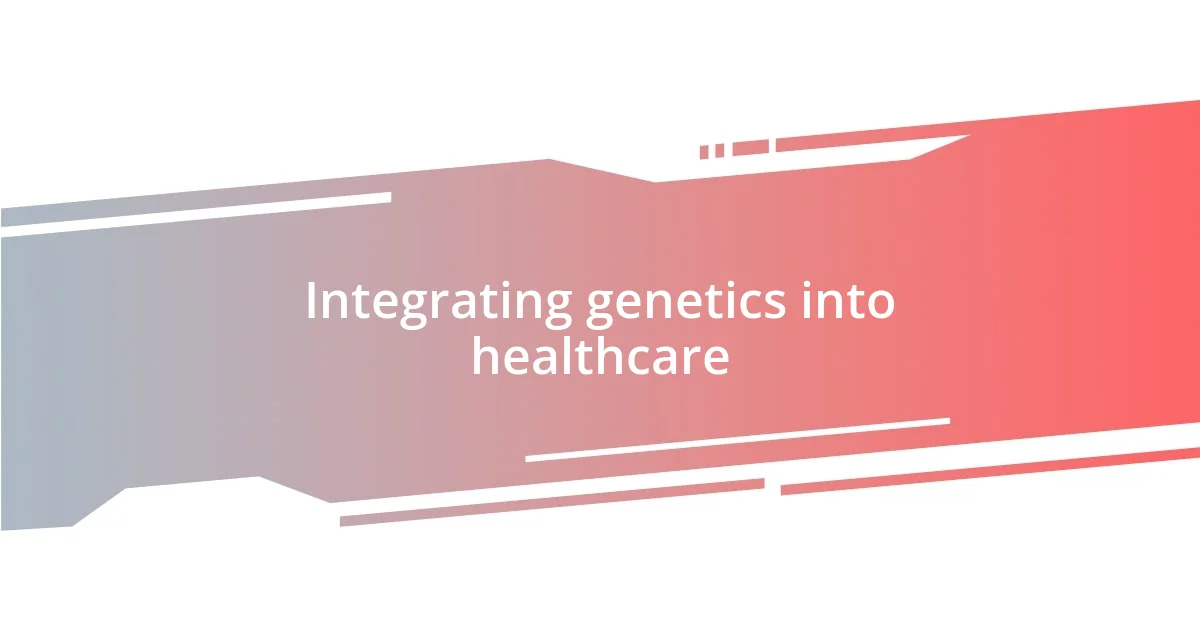
Integrating genetics into healthcare
Integrating genetics into healthcare is like weaving a rich tapestry, where each thread represents a unique element of a patient’s well-being. I remember sitting in a doctor’s office, discussing personalized treatment plans based on my genetic information. It was a powerful moment, realizing that my healthcare was being tailored to my specific genetic profile rather than a one-size-fits-all approach. It’s intriguing—how many of us truly consider the impact our genes could have on the strategies our doctors use for treatment?
Incorporating genetic insights into healthcare offers immense potential, especially in conditions like cancer, where targeted therapies can significantly improve outcomes. I recall learning about how certain gene mutations could dictate which medications would be most effective for me. Knowing that my treatment plan would be influenced by my genetic makeup felt empowering. Isn’t it fascinating how a simple change in our understanding of medicine can elevate the standard of care?
Moreover, integrating genetic information into routine healthcare fosters proactive health management. For instance, after I discussed my genetic predisposition to certain conditions with my physician, we carefully crafted a monitoring plan. This step made me realize that instead of merely reacting to illnesses, I could take charge of my health journey. Don’t you think having that level of involvement due to genetic insights can reshape how we view our health?
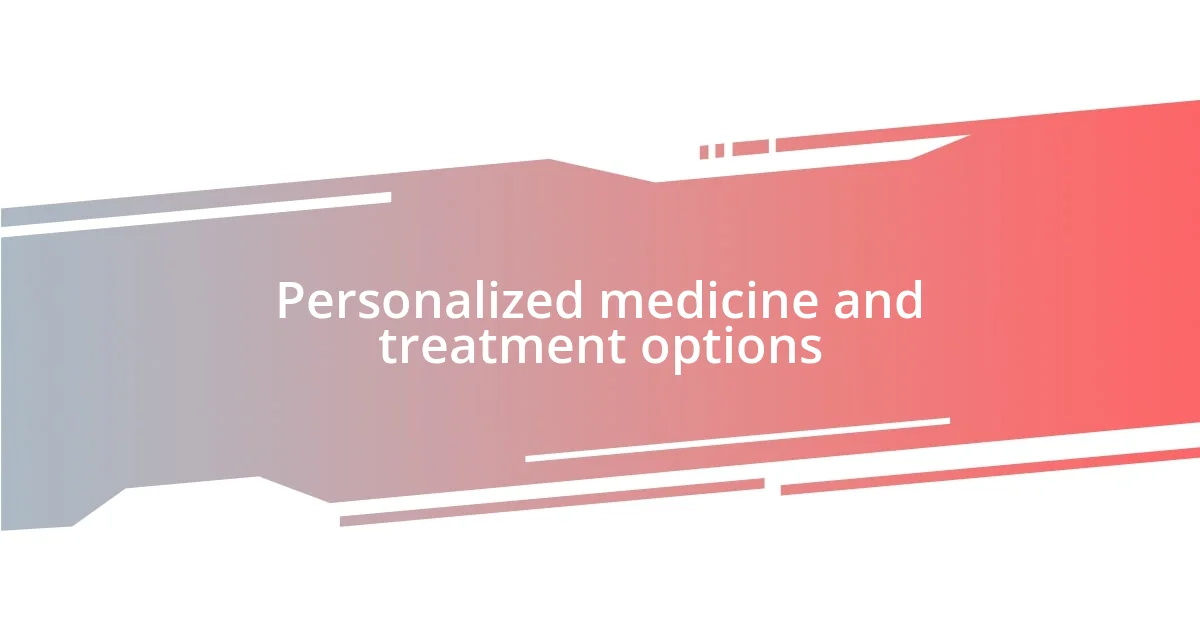
Personalized medicine and treatment options
Navigating the world of personalized medicine has been a transformative experience for me. I vividly remember my first consultation where we discussed how medications could be tailored to my unique genetic profile. It struck me how this individualized approach could enhance treatment efficacy in ways I had never considered before. Have you ever thought about how a drug’s success can depend on your DNA? It’s fascinating to realize that our genes can dictate not just our health risks, but also how our bodies respond to various treatments.
The concept of precision medicine truly opened my eyes to the idea of targeted therapies, especially during my discussions regarding potential cancer treatments. I learned that certain gene variations in my profile could predict how well I might tolerate medications like chemotherapy. It was both enlightening and a little overwhelming—knowing that my genetic makeup could be the key to unlocking a more effective treatment plan. Isn’t it liberating to think that there’s no need to go through a trial-and-error process when there’s a way to find what works best based on our biology?
Moreover, the emotional weight of having personalized options didn’t just stay within the clinical setting. After those discussions, I found myself feeling more proactive about my health choices. It was as if I had a roadmap that outlined not just risks but also strategies for better health. I began to reflect on how this tailored approach could reduce anxiety and give more control over my health journey. How empowering is it to know that our medical narratives can be uniquely crafted based on what our genes tell us?










